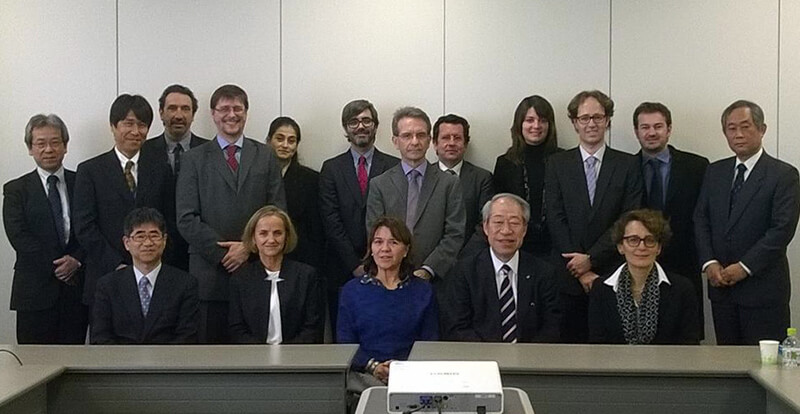
Mind the Byte and Parmaphenix have participated in a trade mission of the Government of Catalonia to Japan and South Korea
From 23 to 28 February, a total of 57 Catalan companies and organizations from five different sectors participated in a trade mission organized by the Generalitat of Catalonia in Japan and South Korea with the aim of identifying new business opportunities and boost trade between Catalonia and the two Asian countries. Biocat accompanied the Catalan Biopharma delegation of companies, made up of 12 companies from the sector, including Mind the Byte and Pharmaphenix, based at Parc Cientific de Barcelona.
Mind the Byte and Parmaphenix have participated in a trade mission of the Government of Catalonia to Japan and South Korea
In the mission –headed by the Secretary of Business and Competitiveness, Pedro Torres- the Generalitat set up a series of scheduled visits according to trade sectors, through foreign offices of Trade and Investment from ACCIÓ in Tokyo and Seoul. The visits scheduled for the biopharmaceutical sector included meetings and networking sessions with key associations and leading companies from Japan and South Korea, as well as presentations on regulatory and approvals legislation of both Asian countries with the objective for companies to enter into contact with potential partners to develop their project and enter these markets.
Montserrat Vendrell, CEO of both Biocat and the Parc Cientific de Barcelona, gave several presentations on behalf of the biopharmaceutical industry in Catalonia. “These meetings make it possible to work together in the future, and for companies there’s great potential for reaching agreements” Vendrell says. Biocat CEO also explained future projects: “We will work with the Osaka cluster to participate in the upcoming Bio Japan congress in October, the most important in Asia”.
In Japan, companies held meetings with companies from the Northern Osaka Bio Medical Cluster, a dynamic area of Japan that is home to 50% of the country’s pharmaceutical sector companies and visited Chugai Pharmaceutical, one of the leading biopharmaceutical research companies in Japan. They also visited the RIKEN CDB technological center and the Kobe Medical Innovation Cluster, comprised of 260 companies, hospitals and institutes. A cluster that has become the largest biomedical cluster Japan. In addition, Tokyo hosted a seminar and networking session between Japan Bio Association (JBA) and the Catalan biotech sector.
In South Korea, business meetings were organized with the Korea Pharmaceutical Manufacturers Association (KPMA) and visits were scheduled at LG Life Science in Seoul and Osong BioValley.
“The trip has helped us explore the Japanese and Korean markets making the initial contacts to identify local distributors. In Japan we found a great interest in our products (software SaaS) and started negotiations with a company to reach an agreement as our local distributor. In Korea, we did more prospection and focused on services, contacting different pharmaceutical companies Although Korea has great potential, Korea is not as experienced in this sector. There are many biopharmaceutical companies, but computational drug design remains an area of R + D + i that has not spread much” says Alfonso Nonell-Canals, founder and CEO of Mind the Byte.
Pharmaphenix has used this visit to Korea to sign a new lease agreement with a local company that focuses its activities on developing drugs. The said companyt is looking for partners to market its latest product in Latin America, Europe and Middle East. “Our presence in Korea also coincided with the closing of a negotiation between a Korean laboratory and a Mexican laboratory that will result in the signing of a license agreement next March 3. Our team in Korea (consisting of 5 people) is also providing support to Spanish companies seeking to enter the Korean health market. We hope to bring new products from some Catalan companies to Korea and to bring products from Korean laboratories to strengthen the portfolio of other Catalan laboratories” says Pascal Nitzet, CEO of Pharmaphenix.
Two markets with great potential for the biosector
Japan is the Asian country with the highest purchasing power in the region. It is the third global economy and the largest investor in the Asia-Pacific region. Furthermore, Catalonia is home to 87.33% of all Japanese companies established in Spain, with Catalan exports to this Asian country making up 27% of all those from Spain.
South Korea is the region´s 4th most powerful country and e 2nd highest per capita income. It ranks 11th in the global pharmaceutical market and R&D expenditure makes up 4% of the country’s GDP. Moreover, according to data from the World Bank, South Korea is the 8th country in the world in terms of ease of starting a business. The Government opted for this market by opening 2012 field office ACCIÓ Trade and Investment in Seoul.
“Both the Japanese and Korean markets, the first being more mature than the latter, but both with great potential, are of great interest for companies in the Biopharma sector because the governments of both these countries have made a strong commitment to R & D. In Korea, for example, investment in R & D is expected to increase from 1,000 million in 2011 to 6,000 billion by 2020. It should be noted, too, that in both countries a strong interest and robust experience in biologics (antibodies , proteins, peptides., etc.) has been identified” says Alfonso Nonell-Channels.
Pascal Nitzet also highlighted, that in addition to the growth and commitment to investment in R + D + i of both countries “in the case of Japan we found a market immersed in a more advanced internationalization process, with subsidiaries in Europe and North America and recent purchases of several laboratories in Europe by Japanese laboratories. However, with some exceptions, Latin America remains the unfinished business of Korean and Japanese laboratories”, Pascal Nitzet says.




